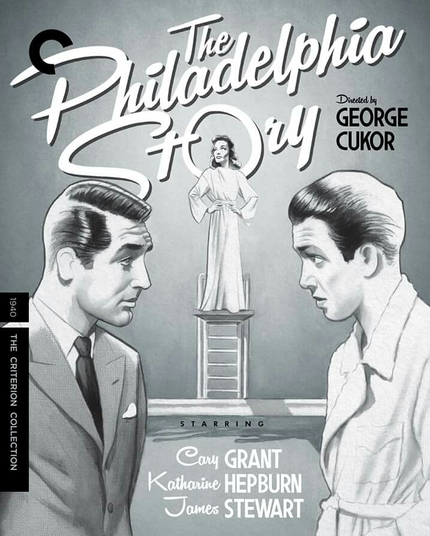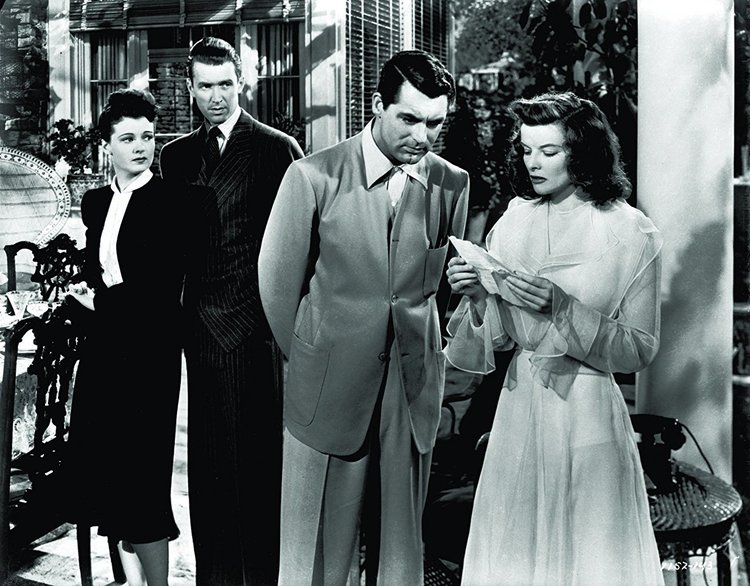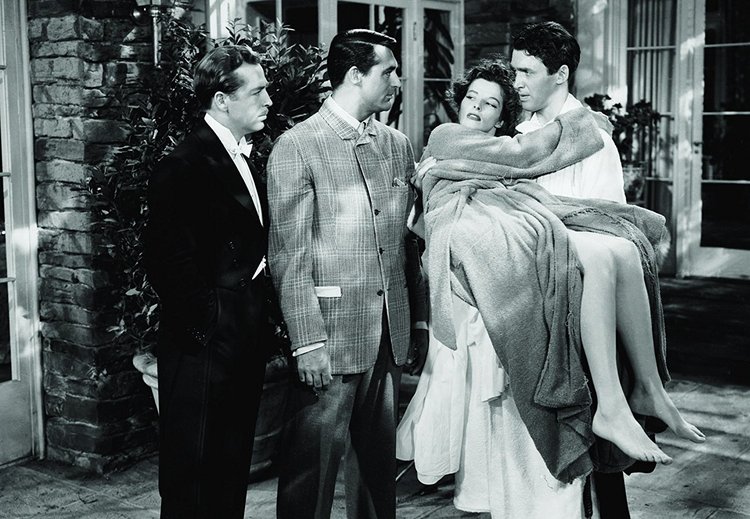Blu-ray Review: THE PHILADELPHIA STORY Classes Up Criterion
Katherine Hepburn, Cary Grant and James Stewart star in this lavish screwball comedy of manners

Despite harboring a healthy love for classic Hollywood’s great works, there’s something about the 1940 comedy The Philadelphia Story that’s always presented a barrier to me.
Is it the class presentation? It’s a film about extremely wealthy Americans doing extremely wealthy American things. Is it that it invites - make that manipulates - us into a universal empathy for these extremely wealthy people? I’ve come to realize that if so, it’s only to a small degree. Dig in too completely against those elements, and you fence off many, many tremendous and rewarding works of the era. And, before too long at all, it becomes your problem, not the films’.
No, the exhausting thing about The Philadelphia Story is the sheer wattage of its central cast. A three-fer of classic Hollywood’s grandest acting talents, the film stars Katharine Hepburn, ever the sparking freight train. Then, there’s Cary Grant, a wholly magnetic screen presence and scene stealer the moment he walks into frame. Filling out the trifecta is Jimmy Stewart, perhaps the most beloved actor of all time. The cherry on top is their indelible chemistry. Marquee bursting aside, these stars actually belong in the same movie.
The three leads, plus a delightful Ruth Hussey, her reporter harboring an unrequited love for her professional partner Conner (Stewart), spend the film almost entirely together on the grounds of the lavish estate occupied by Tracy Lords (Hepburn). For a time, Tracy was the wife of one C.K. Dexter Haven, a man of ever-suave wit and charm (Grant). In a honey of an opening scene, we witness his stormy departure.
It’s a quick and dirty wordless two-hander uncharacteristic of director George Cukor: Dexter harrumphs out the front door to a waiting car, packed bags in tow. He’s flanked by Tracy, who throws down his golf clubs, save a single favorite, which, to his scorn, she promptly breaks over her knee. Retaliating, he thinks better of socking her, opting instead to aggressively push her back into her open door. The fact that Hepburn somehow goes down hilariously like a stiff board completely nullifies any notion of spousal brutality that may cross one’s mind. Next thing she knows, there she lays, alone and short a few degrees of pride.
However much later, though, Tracy is set to marry George Kittredge (John Howard), a nice enough honorable stiff. Ah, but is he really…? Lifeless though harmless, we all know that Tracy is much too much of a fireball for this man. Alternately, even divorced, C.K. Dexter Haven seems far more cut out for her. Being Cary Grant and all, Haven has the speed to track her spunk, with a cutting edge to boot.
Also, he has the benefit of direct experience. Upon finding out the profession of pair of reporters that are there on assignment courtesy of their paper’s society page, Haven remakes, “A writer? And here I thought all writers drank to excess and beat their wives.” Then subtly giving his ex-wife the stink eye, “Once upon a time, I secretly wanted to be a writer.”
Not soon after, in the midst of filling out a four-cornered love triangle, Conner, smitten with Tracy, sizes her up thusly: “The young, rich, rapacious American female. No other country where she exists.” Naturally then, he eventually winds up carrying a passed out Tracy back to her compound, drunkenly bellowing “Some Day Over the Rainbow....!” (screwed up title lyric and all).
Is their jaunt in the night what it looks like? Did some atrocious pre-wedding dalliance occur...? Later as Tracy questions Conner about the night before, he’s shocked, simply shocked that she doesn’t recall. They swam in the lavish pool, of course. But just for a moment, this pre-war, still-innocent Stewart eyes her up with all the fixed obsession he brings to Vertigo.
Anyhow, one thing’s for sure. The promised climax of all of this is a big wedding, so someone’s going to have to get married. Tracy could be a good girl and stick to the plan… but what fun would that be? This is a girl with options. Options and pathos, but mostly options. With one foot in screwball comedy and the other in the comedy of manners, this could go any which way. And watching it steer itself to the inevitable alter is the great joy of it.
If all of this sounds familiar but somehow off, one may be thinking of the full color 1956 remake, High Society. Helmed by Charles Walters, High Society, an equally star studded (Grace Kelly, Frank Sinatra and Bing Crosby) but far inferior musical version of Barry’s story that, frankly, can go jump in its own pool.
Though dripping with wealth and privilege, The Philadelphia Story, true to form of Phillip Barry’s play, sidesteps much of the lavish escapist trappings of so many of its depression era Hollywood comedy forbearers. Barry, working tightly in tune with Hepburn herself, custom crafted the Tracy Lords character in the image of the actress.
In the midst of a crushing career downswing having been labeled “box office poison” following Mary of Scotland, her one and only on-screen collaboration with director and close confidant John Ford. The play, starring Hepburn for hundreds of performances including a national tour, proved a smash, and the film soon followed. With Grant, Stewart and Cukor on board, Hepburn found her film career back on track. And there it would stay.
Though Franz Waxman is credited as composer, the general lack of musical score in the film (far from uncommon in the time) is sometimes obvious, occasionally lulling, in a more negative way. It does, however, make more room for the dense deluge of dialogue, the volume of which shouldn’t surprise anyone considering that A) this film is based upon a stage play, and B) Joseph Mankiewicz, the later king of sophisticated yak-fest movies, is the only credited producer.
When certain folks wax nostalgic for a cleaner, more wholesome age of dignified movies, The Philadelphia Story, at a quick pass, is precisely what they’re thinking about. Yet, hinging from beginning to end on did-she-or-didn’t-she sexual ratcheting, The Philadelphia Story is many things, but “wholesome” cannot ever be one of them.
The whole reason we common folk are able to relate to this subset, in all their silk robes and soirées, is because of the confusion and desperation in their relationships. Hepburn, that wittiest of bohemian feminists, orchestrated her Hollywood comeback on the flicker and entendre of this one film. Clean, sure. But wholesome? Don’t make us laugh. Or better yet, do.
Word in the film world is that Criterion's landing of The Philadelphia Story, a studio catalog heavy-hitter by no small measure, was actually a win-win for all parties involved. The elements of the film were said to be in poor shape not suitable for high definition, and Criterion had both the wherewithal and willingness to commit to a proper digital restoration whereas the studio… not so much. Even five years ago, a classic of this caliber on this label would’ve been a far more unlikely, but in today’s world of nearly all physical media going the way of boutique companies, Criterion is king.
The resulting transfer of the black and white image is simply excellent. The disc provides a new 4K digital restoration of the film which is simply not to be beaten. The soundtrack is a purist’s joy, uncompressed monaural. Criterion brings us some fine bonus content as well, including a new short documentary about the creation of the iconic Tracy Lords character. Additionally, there’s a trailer, an impressive restoration demo, and a printed essay by critic Farron Smith Neheme in the accompanying pamphlet.
The best extra, though, is inclusion of over two hours of the television-averse Hepburn’s landmark appearance on The Dick Cavett Show, itself worth the price of admission alone. Taped in the late 1970’s, the self-assured icon of female empowerment proved to be everything her legend entails: Biting but personable; self-critical yet comfortable in her own skin. Cavett is respectful but keeps up with her every move. It’s pure TV gold.
Also included is a commentary track by the always welcome Jeanine Basinger, one of the foremost historians of the Hollywood studio system, and quite obviously a true fan. Basinger makes no secret of which man she thinks Tracy Lords ought to end up with. The track is a carry-over from the 2005 Warner Brothers deluxe DVD release of the film, itself nothing to sneeze at back in the day.
Criterion’s Blu-Ray of The Philadelphia Story, much like the film itself, is an embarrassment of riches, dizzying to behold. For film buffs, it’s like exhaustion of the best variety.









